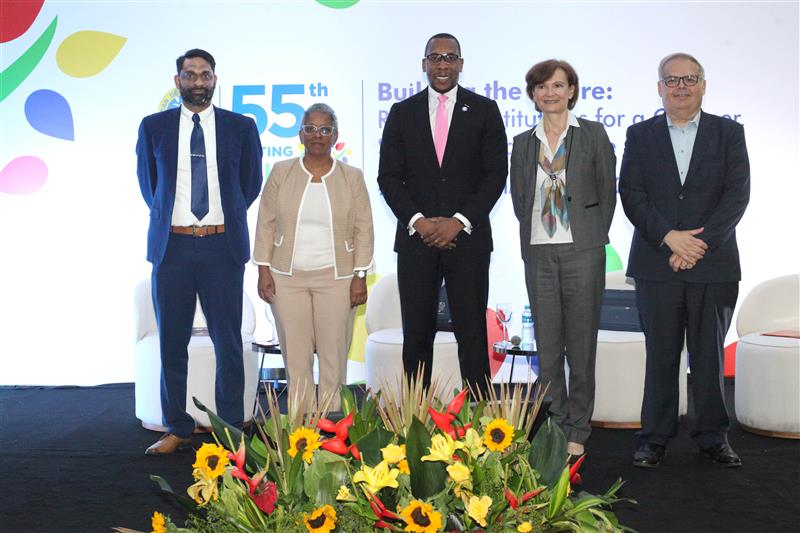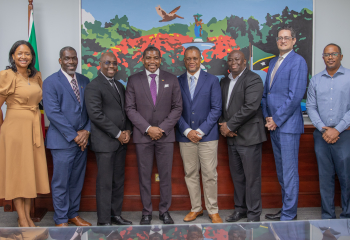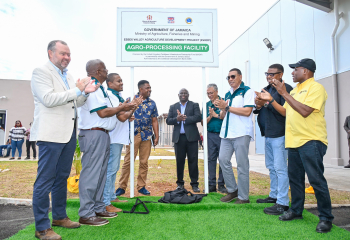Fintech can be a Catalyst for Financial Inclusion and Economic Resilience in the Caribbean

Fintech could be a game-changer for financial inclusion, business safety, and regional economic transformation in the Caribbean, if it is developed with inclusion, safety, and equity at its core. That’s the consensus among central bankers, development economists, and international financial experts who recently explored the issue at a high-level seminar hosted by the Caribbean Development Bank (CDB).
As Caribbean countries confront increased inequality, limited access to credit, and persistent vulnerability to economic shocks, fintech solutions offer clear, practical advantages. Experts point to technology’s potential to improve access to markets and finances for women-led businesses and micro, small, and medium-sized enterprises (MSMEs), reduce risks for entrepreneurs, and enable the region to leapfrog costly legacy systems.
“Fintech offers a gateway for the region’s unbanked and underserved communities to participate in the financial system by using modern payment systems that address existing barriers such as information asymmetry and cost,” said Ms. Christine Dawson, CDB’s Acting Director of Economics.
At a broader level, fintech can support entrepreneurship, expand market access, and fuel regional trade, critical components of inclusive and resilient economies. “Many women-led MSMEs rely on non-bank lenders, credit unions and microfinance institutions, [while] traditional financial institutions often overlook them,” said Ms. Lilia Burunciuc, Country Director for Caribbean Countries at the World Bank Group. “Our experience shows these businesses represent real opportunities. Fintech can help bridge that gap.”
Security is also a major advantage. Digital payment systems eliminate the need for entrepreneurs, especially those operating in remote or high-risk areas, to carry or store cash. “A small business person, an entrepreneur, woman or man, a young person in any part of our region, including in a rural community, ought to be able to operate a business at any time of day, especially at night, without fear of being robbed,” said Mr. Timothy Antoine, Governor of the Eastern Caribbean Central Bank. “That’s why we need digital tools. It’s not just about efficiency; it’s about safety.”
Evidence from Brazil suggests the Caribbean doesn’t need to start from scratch to scale similar solutions. Mr. Angelo José Mont Alverne Duarte of the Banco Central do Brasil cited the success of Brazil’s PIX instant payment system, which processed over 63 billion transactions in 2024, valued at USD 4.6 trillion. “Technology is the way to offer financial services at very low cost,” he said. “What works in a large country like Brazil can work in a small country too… This is where Caribbean countries have a real opportunity to leapfrog legacy systems.”
Governor Antoine also made a strong case for embracing fintech as part of a broader development shift. “We cannot change our history of slavery and colonialism. We can't change our geography, the fact that we are some of the most climate-vulnerable countries in the world. But what we can change is our development trajectory through innovation, fintech and collective action. And that is what we must aim to do—with a great sense of urgency,” he said.
The seminar, “Fintech: Finding the Balance Between Disruption and Creation”, was held in June during the 55th Annual Meeting of CDB’s Board of Governors in Brasília, Brazil. It aimed to raise awareness and to advocate for a regional digitalisation strategy and fintech roadmap, while highlighting the structural and policy reforms required to support such an agenda.
###
Photo Caption: Participants share a photo moment after the Caribbean Development Bank’s recent seminar entitled “Fintech: Finding the Balance Between Disruption and Creation”, (from left) Mr. Dindial Ramrattan, Statistician, CDB (Moderator), Ms. Christine Dawson, Acting Director of Economics, CDB, Mr. Timothy Antoine, Governor of the Eastern Caribbean Central Bank, Ms. Lilia Burunciuc, Country Director for Caribbean Countries at the World Bank Group and Mr. Angelo José Mont Alverne Duarte of the Banco Central do Brasil. The seminar was held last month during the 55th Annual Meeting of CDB’s Board of Governors in Brasília, Brazil.


